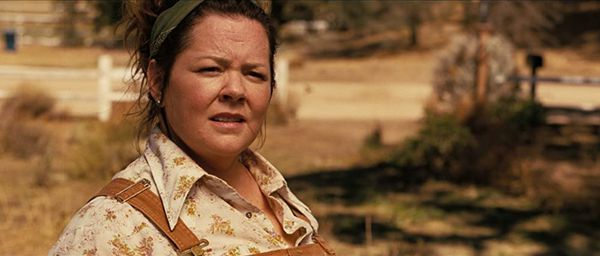Eye For Film >> Movies >> The Starling (2021) Film Review
The Starling
Reviewed by: Jennie Kermode

One of the functions of cinema - intentionally or otherwise - is to start conversations and help us to understand different issues we might face in life. Some of its narratives are commonplace elsewhere; others far less so. Over the past year, due to the global pandemic, far more people have been dealing with bereavement in the UK (and many countries like it) than at any time since the Second World War, yet there has been a dearth of public conversation about how to deal with it. The Starling is an early entry in a new wave of films aiming to fill this gap.
Lilly (Melissa McCarthy) and Jack (Chris O'Dowd) have lost their infant daughter. Jack has found himself completely unable to cope, and has been institutionalised, leaving Lilly to cope alone. Friends and workmates try to support her but don't know how. Grief is always a very personal, individual experience. The counselling sessions which she and Jack have attended together have only succeeded in causing her profound irritation. She doesn't want to talk about it. She's the kind of person who grabs life by the throat, not the kind who puts up posters of cute animals with inspirational quotes on.

McCarthy's presence in the central role explains both the film's success and its poor reviews. She excels in comedic roles, and it's no surprise that fans of her work in films like Spy and the Ghostbusters remake want more of the same, but as films like St Vincent and Can You Ever Forgive Me? have shown, she has a lot more range than that, and can do impressive work in a (mostly) straight role like this one. People who go into it thinking they're going to see a wacky comedy about a woman who talks to a bird will naturally be disappointed. This is simply not that type of film. Those who approach it as a sensitive exploration of issues around mental illness and bereavement will have a very different experience.
There are no talking animals here, and no sentimental human-animal friendships either. The bond which forms between Lilly and the bird in her garden is founded on enmity. They compete over territory; it has built a nest in a tree there and dive bombs her to try and drive her away. Out of this enmity grows a sort of respect, however, and despite early attempts to murder it, Lilly comes to admire its persistence. She also forms a new friendship with a former psychiatrist now working as a vet (Kevin Kline), who, despite having limited patience with her bullshit, gradually helps her yo recognise that she, just like Jack, has to put some work in before she will really be in control of her life again.
Grief of this type isn't just about the pain of loss; it's also about the disorientation that results from day to day life changing so drastically. In the absence of meaningful public discussion, it's also something which leaves people struggling to know how to interact with the world because their roadmap through life has gone. They simply don't know what comes next. Screenwriter Matt Harris understands this very well and rather than focusing on tears and soft-focus memories as many films about loss do, The Starling takes a very practical approach to exploring the process of readjustment. With Jack and Lilly on very different journeys, most viewers will find something they can relate to, whilst wondering if the couple are going to be able to save their marriage (and, indeed, if they should be trying to). It's a mature approach to the subject which is long overdue.
There are occasional lapses into sentiment, and some of the metaphors are addressed in a heavy-handed way, especially towards the end. This isn't a vigorously intellectual approach to the subject but one intended to be accessible to people from all walks of life. It works well within its chosen limits and one hopes that it will remind casting directors to keep McCarthy in mind for a much wider range of roles.
Reviewed on: 26 Sep 2021

















